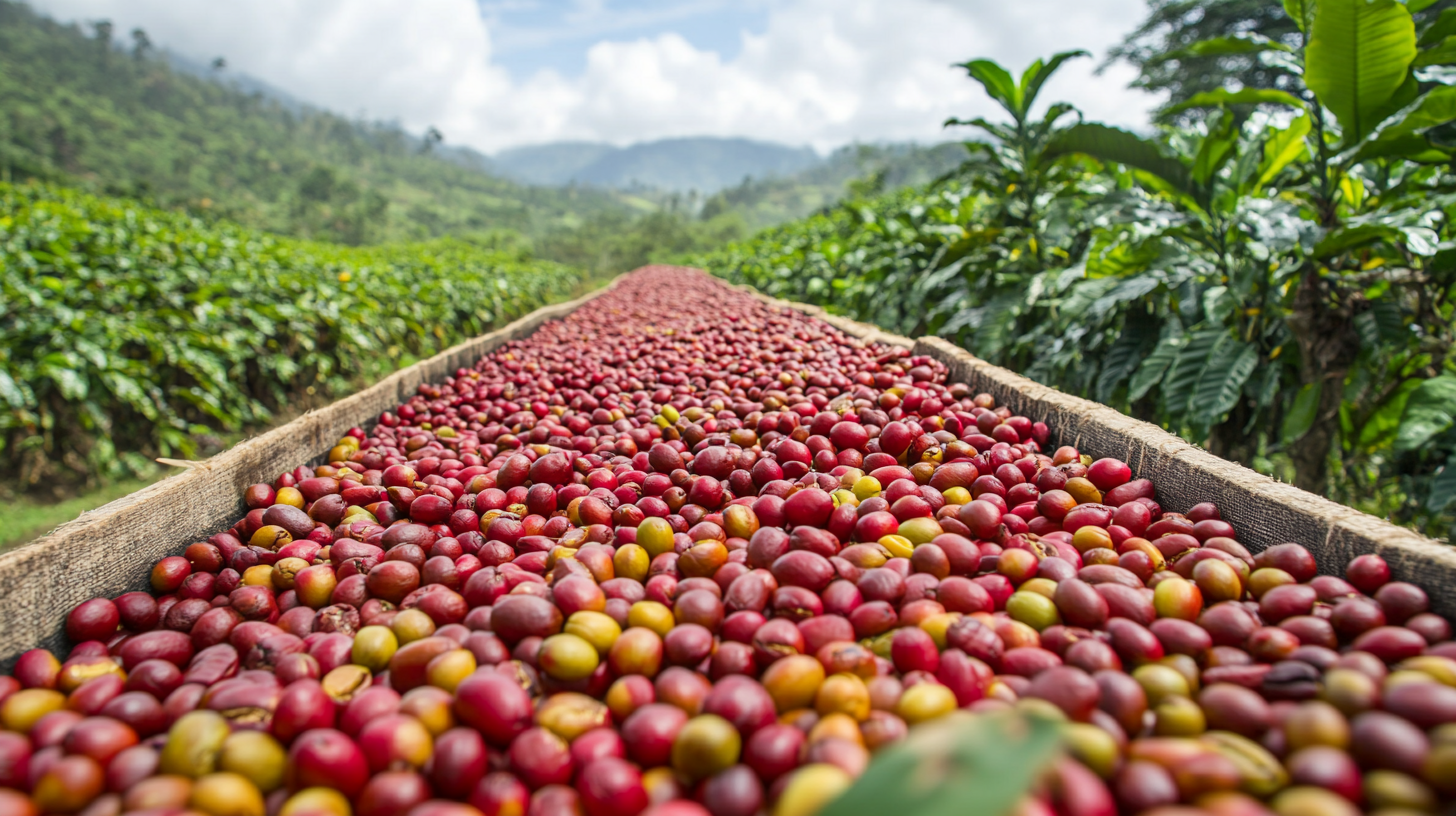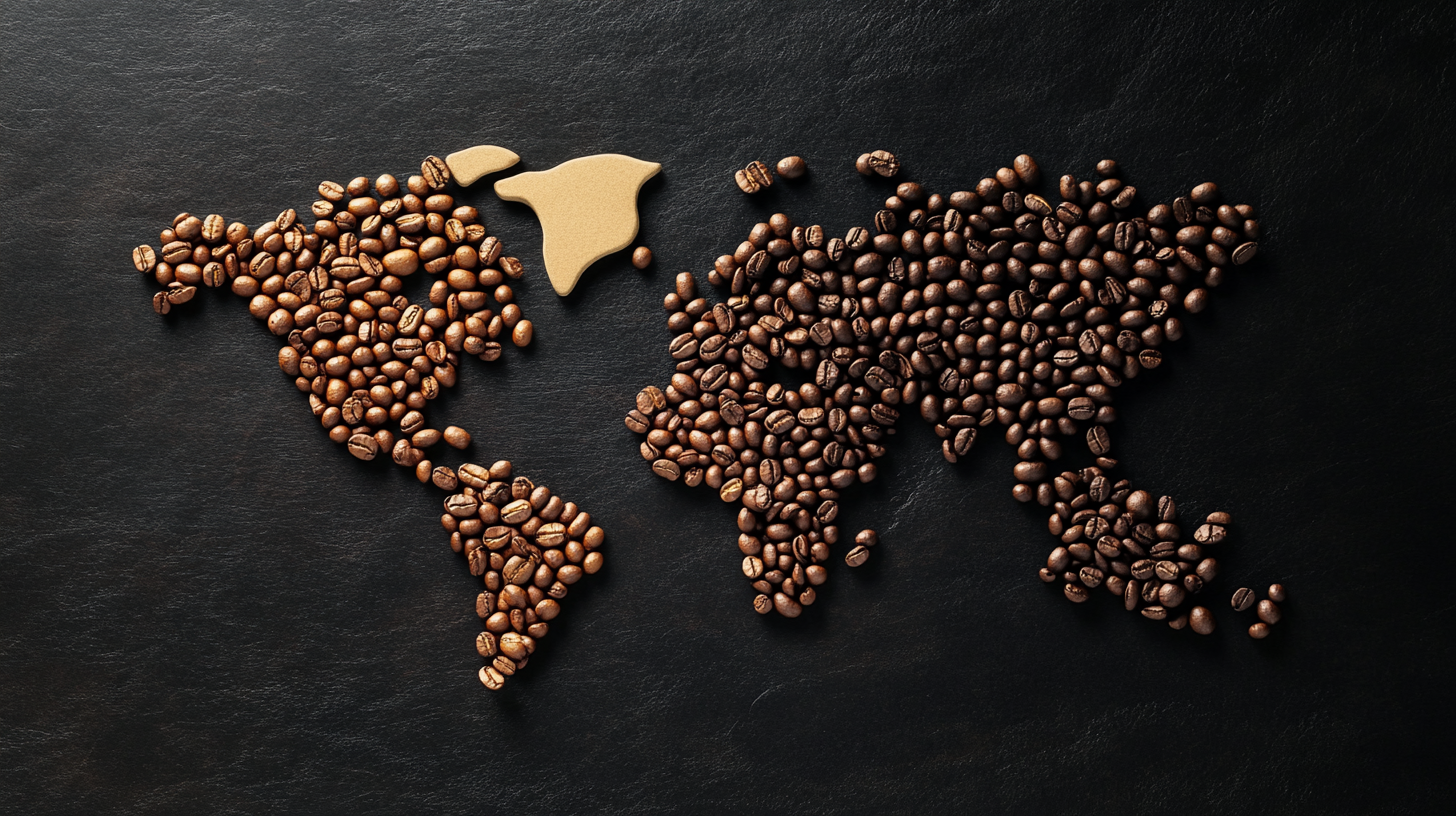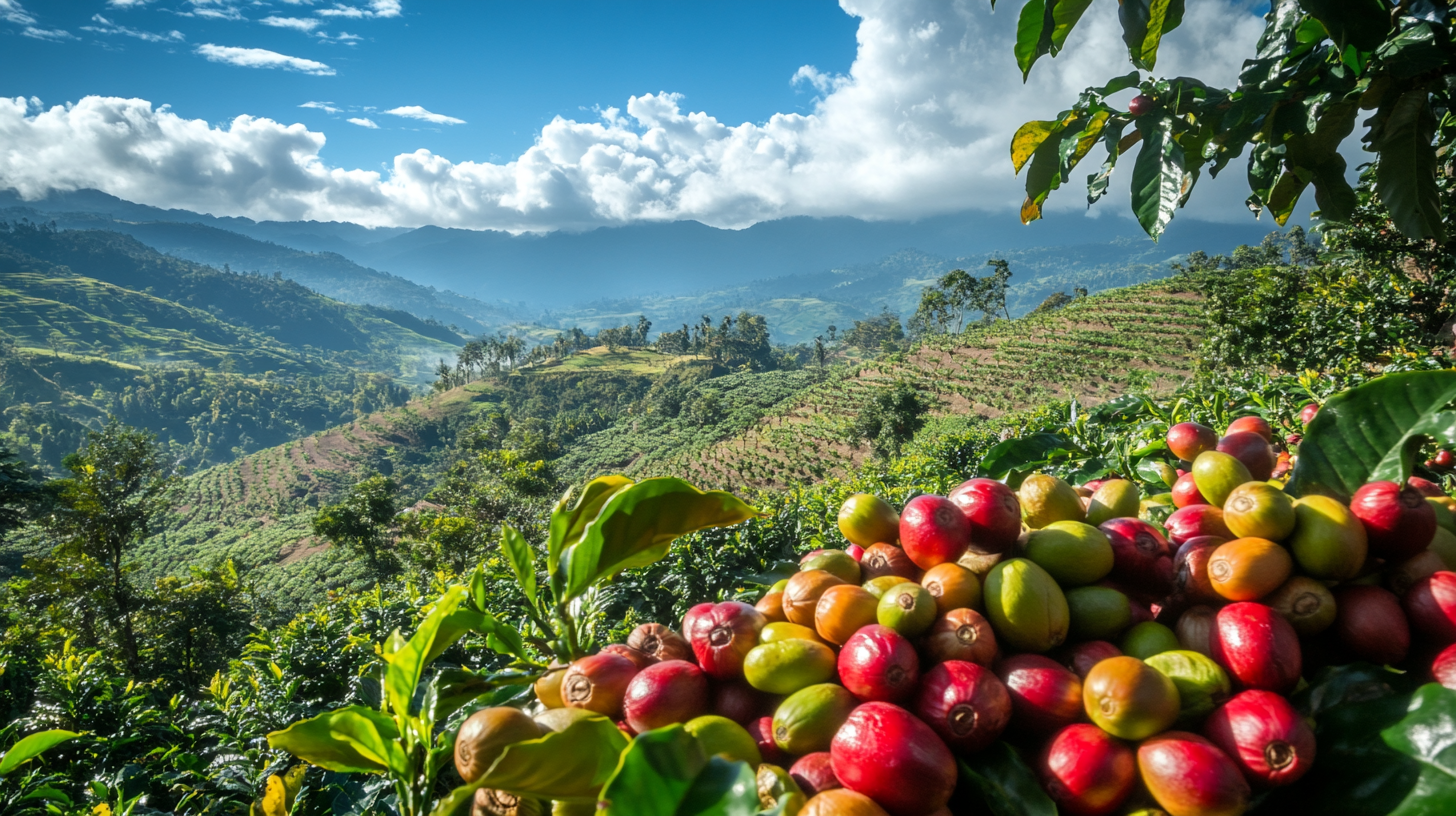Unlocking the Potential of High Quality Coffee Beans for Global Trade Growth
In the ever-evolving landscape of global trade, one commodity stands out for its potential to drive economic growth and foster international collaboration: high quality coffee beans. As the world becomes increasingly interconnected, consumers are seeking excellence in their morning brew, leading to a surge in demand for premium coffees. The intricate journey of coffee, from the delicate cultivation of Arabica and Robusta varieties to the sophisticated processing techniques that enhance flavor profiles, underscores the importance of selecting the best beans. This pursuit of quality not only influences consumer preferences but also shapes the dynamics of global markets.
Unlocking the potential of high quality coffee beans goes beyond mere taste; it encompasses sustainable farming practices, fair trade initiatives, and technological advancements that can uplift communities. As coffee-producing regions strive to meet international standards, they can tap into lucrative markets and elevate their economic status. This blog will explore the multifaceted advantages of high quality coffee beans in global trade, examining how they contribute to economic development, promote sustainability, and create a paradigm shift in consumer behavior. Join us as we delve into the rich world of coffee and uncover the opportunities that lie within each premium bean.

The Importance of Quality in the Coffee Bean Supply Chain
The Importance of Quality in the Coffee Bean Supply Chain
In the global coffee market, quality plays a pivotal role in determining not only the flavor and appeal of the final product but also its economic viability. According to the International Coffee Organization, the global coffee market was valued at approximately $102 billion in 2021, with the demand for high-quality beans continuing to rise. Consumers are increasingly discerning, seeking out specialty coffee that offers unique flavor profiles and ethical sourcing, which in turn influences the entire supply chain.
Investing in quality at every level of the supply chain—from cultivation to processing and distribution—can significantly enhance profitability for producers and exporters. A report from the Specialty Coffee Association highlights that beans classified as specialty, which represent the top 20% of coffee in terms of flavor quality, can command prices up to 300% higher than lower-grade beans. This stark contrast illustrates the financial benefits of prioritizing quality over quantity in coffee production.
Furthermore, the traceability of high-quality coffee has become a critical component for attracting premium markets. Consumers are drawn to products that not only taste good but also reflect sustainable practices. A survey by Statista found that 46% of coffee drinkers in the U.S. are willing to pay more for sustainably sourced beans. This growing trend emphasizes the necessity for transparency and quality assurance throughout the supply chain to build trust and loyalty among consumers, ultimately driving global trade growth.

Challenges in Sourcing and Cultivating High-Quality Coffee Beans
The specialty coffee segment is experiencing a vibrant transformation, poised for impressive growth. According to recent market research, the global specialty coffee shops market is projected to expand by an astounding US$57.41 billion between 2024 and 2028. This growth underscores a rising consumer demand for high-quality coffee and presents a unique opportunity for producers to enhance their sourcing and cultivation strategies to meet these evolving preferences.
However, challenges persist in the sourcing of high-quality coffee beans. Starbucks, a key player in the global coffee market, is actively addressing these issues by developing new arabica varietals that are specifically cultivated to withstand the climate challenges threatening coffee production. The company's investment in innovation farms in Guatemala and Costa Rica is part of a broader effort to safeguard the future of coffee cultivation. These initiatives are crucial as the world faces increasingly unpredictable weather patterns that could impact bean quality and supply.
Furthermore, firms like Nestlé are also taking significant steps to strengthen their coffee supply chains by introducing high-yielding arabica varieties. By leveraging agricultural sciences, they aim to enhance both the quantity and quality of coffee produced. This proactive approach to cultivating robust coffee varieties not only helps in securing a sustainable supply but also aids in maintaining the high standards demanding in the specialty coffee market. Tackling these challenges head-on is essential for fostering growth in global trade and ensuring that high-quality coffee continues to satisfy consumer palates worldwide.
Unlocking the Potential of High Quality Coffee Beans for Global Trade Growth
This pie chart illustrates the distribution of various factors influencing the quality of coffee beans sourced globally. Understanding these factors can help improve the cultivation and sourcing of high-quality coffee, essential for trade growth.
Ways to Enhance Coffee Bean Quality for International Markets
Enhancing coffee bean quality for international markets is crucial for producers aiming to thrive in a competitive global landscape. One effective strategy is to adopt rigorous harvesting practices. Farmers should selectively handpick ripe cherries, ensuring that only the best-quality beans are processed. This method not only improves the overall flavor profile of the coffee but also boosts the reputation of the coffee-growing region, attracting buyers looking for premium products.
Investing in post-harvest processing techniques is another key factor in elevating coffee quality. Utilizing modern methods such as improved fermentation processes and meticulous drying techniques can significantly enhance the flavor and aroma of the beans. Implementing controlled environments during drying helps prevent the development of defects and preserves the unique characteristics of the coffee, which can set a product apart in international markets.
Furthermore, fostering strong partnerships between producers and exporters can help streamline the supply chain, ensuring that quality standards are consistently met. Educational programs focusing on sustainable agricultural practices and quality management should be promoted to empower farmers. By emphasizing quality at every stage—from cultivation to export—producers can unlock the full potential of their coffee beans, catering to the growing demand for high-quality products around the globe.
Unlocking the Potential of High Quality Coffee Beans for Global Trade Growth
This chart illustrates the quality score of different coffee bean types evaluated for international markets. Higher scores represent better quality, which can enhance trade opportunities.
The Role of Certification and Standards in Global Coffee Trade
The global coffee trade is a complex ecosystem where quality, certification, and standards play crucial roles in determining market viability and growth. Certification programs, such as Fair Trade and Rainforest Alliance, ensure that coffee beans meet specific quality and sustainability criteria. According to a report by the International Coffee Organization (ICO), certified coffee now accounts for over 30% of the global coffee market, a significant increase from previous years. This shift highlights the growing consumer demand for ethically sourced products and the importance of quality assurance in trade.
Moreover, adherence to international standards not only enhances the quality of coffee but also promotes transparency and traceability within the supply chain. The specialty coffee sector, which has seen a robust annual growth rate of approximately 12%, relies heavily on such standards to differentiate its products. Certifications like Specialty Coffee Association (SCA) standards elevate the quality expectations, enabling producers to command higher prices. Furthermore, research from the Specialty Coffee Association indicates that consumers are willing to pay up to 25% more for coffee that is certified as organic or fair trade.
Incorporating quality assessments and certification into the coffee trade fosters a healthier global marketplace, benefiting producers and consumers alike. Such initiatives contribute to sustainable farming practices and social equity, ultimately unlocking the full potential of high-quality coffee beans and driving growth in international markets. As the demand for premium coffee continues to rise, the role of certification and standards will become increasingly vital in shaping the future of coffee trade.
Unlocking the Potential of High Quality Coffee Beans for Global Trade Growth - The Role of Certification and Standards in Global Coffee Trade
| Country | Coffee Production (Metric Tons) | Certification Type | Export Value (USD) | Year |
|---|---|---|---|---|
| Colombia | 900,000 | Rainforest Alliance | 1,200,000,000 | 2022 |
| Brazil | 3,000,000 | Fair Trade | 5,000,000,000 | 2022 |
| Ethiopia | 400,000 | Organic | 850,000,000 | 2022 |
| Vietnam | 1,600,000 | Vietnamese Standard | 3,000,000,000 | 2022 |
| Costa Rica | 220,000 | UTZ Certified | 300,000,000 | 2022 |
Marketing Strategies to Promote High-Quality Coffee to Consumers
In the burgeoning coffee market, the promotion of high-quality coffee beans has become essential for brands looking to capitalize on consumer preferences. Effective marketing strategies harness the 4Ps—Product, Price, Place, and Promotion—to create a compelling narrative around premium coffees. High-quality offerings must be clearly defined, showcasing their unique attributes such as flavor profiles, origins, and cultivation methods. This connection not only appeals to discerning palates but also establishes a narrative that resonates with the growing consumer trend toward sustainability.
Pricing strategies are equally critical. By positioning premium coffees at a higher price point, brands can reinforce their quality perception. However, balancing affordability with exclusivity remains a challenge. Distribution channels should be carefully selected to ensure that the product reaches those consumers most likely to appreciate and invest in high-quality coffee. This may involve partnerships with specialty stores or online platforms that cater to gourmet enthusiasts.
Promotion in the coffee industry has evolved, leveraging social media, particularly platforms like Instagram, to engage with consumers. Visual storytelling can effectively highlight the brand’s story and the journey of its coffee beans from farm to cup. Engaging content, such as behind-the-scenes footage or farmer interviews, can foster a deeper connection with consumers who are increasingly interested in the origins of their coffee. Thus, by deftly implementing these marketing strategies, brands can not only enhance customer engagement but also tap into the significant growth potential of the high-quality coffee segment in the global market.




